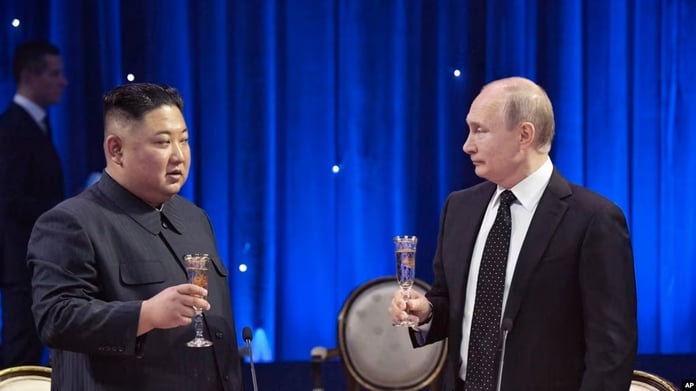A month ago, the world watched as North Korean leader Kim Jong Un set foot on Russian soil, marking a significant moment in international politics. The visit was not just a routine diplomatic exercise; it was a calculated move that showcased Russia’s military prowess to North Korea. President Vladimir Putin took Kim on a tour of Russia’s state-of-the-art Vostochny Cosmodrome and the Gagarin Aircraft Plant in Komsomolsk-on-Amur. The latter is a hub for the production of Russia’s advanced Su-35 and Su-57 fighter jets. The leaders discussed a plethora of issues, including Russia’s ongoing conflict in Ukraine and the potential for Russian assistance in North Korea’s satellite program.
The diplomatic talks were followed by a startling revelation. American intelligence sources released images that showed a shipment of munitions being transferred from a North Korean warehouse to a ship flying the Russian flag. The cargo was then moved to a warehouse near Russia’s southwestern border. According to US intelligence, this operation took place between September 7 and October 1. The US National Security Council was quick to condemn North Korea for aiding Russia in its military operations against Ukraine.
The US State Department later confirmed that the military cooperation between North Korea and Russia was far more extensive than initially thought. Over 1,000 containers filled with military equipment and munitions had been shipped from North Korea to Russia. The list of equipment was exhaustive, including fighter jets, ground-to-air missiles, armored vehicles, and even materials for the production of ballistic missiles.
Joseph Bermudez, a senior fellow at the Center for Strategic and International Studies (CSIS), added another layer to this complex geopolitical puzzle. He noted increased activity at the China-North Korea border, suggesting that China might be using North Korea as a conduit for transferring military equipment to Russia. This triangulation between North Korea, Russia, and China could potentially alter the balance of power in the region and beyond.
According to Bermudez, one of Putin’s primary objectives is to divert US attention towards the North Korean issue, thereby diluting American focus on Russia’s activities. While it remains to be seen how far Russia would go in providing North Korea with advanced military technologies, the possibility of transferring missile guidance systems, submarine navigation technologies, and global strategic reconnaissance resources cannot be ruled out.
Sue Mi Terry, another expert on North Korean issues, highlighted the formation of an anti-Western militarized bloc that includes not just Russia and North Korea, but also China, Iran, HAMAS, Hezbollah, and Syria. This bloc poses a significant challenge to Western powers and could potentially disrupt the existing geopolitical equilibrium.
The US cannot afford to ignore the growing military capabilities of North Korea, especially when backed by Russia. North Korea has been investing heavily in its ballistic missile program, aiming to extend its reach beyond the East Sea to the Pacific Ocean and even the United States. The country is systematically upgrading its armed forces and is keen on acquiring Russian bombers to bolster its military strength.
The international community finds itself in a precarious situation. Sanctions have proven to be ineffective, and diplomatic negotiations have reached a stalemate. The United Nations appears to be a toothless entity in this scenario, as both Russia and China, permanent members of the Security Council, are unlikely to take any action that would jeopardize their interests.
As things stand, the alliance between North Korea and Russia is not just a bilateral relationship; it’s a multi-dimensional strategic partnership that has the potential to redefine global geopolitics. The scale and depth of their military cooperation are alarming, to say the least. The international community needs to recalibrate its approach and come up with a cohesive strategy to deal with this emerging axis of power.


